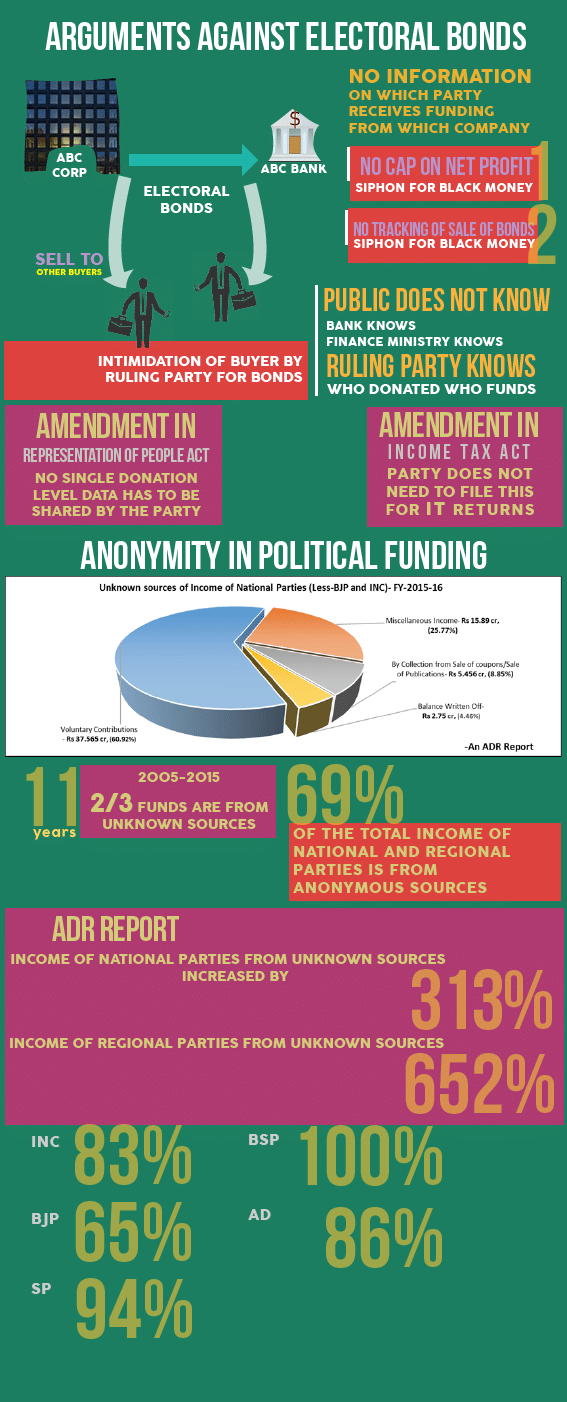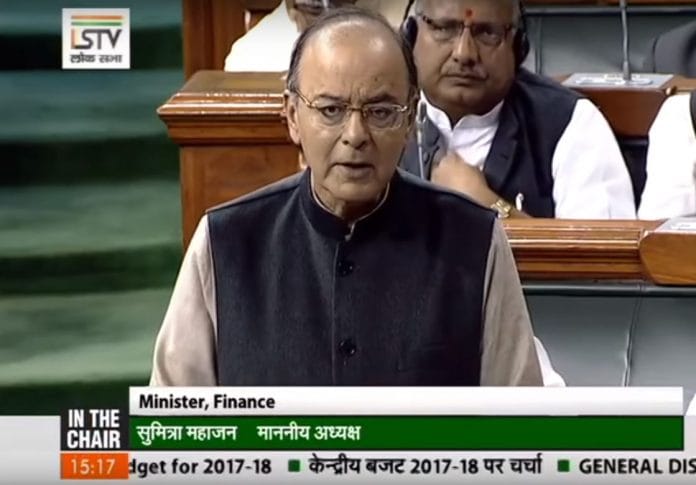Announced in the Union Budget this year, the Electoral Bonds scheme was projected as a major electoral funding reform. But it is facing opposition from multiple quarters. The Congress and the Election Commission have raised concerns. As ThePrint reported last week a PIL is set to be filed against the scheme, claiming it will violate principles of transparency in political funding.
Do Electoral Bonds fit into the larger framework of free and fair elections? We ask experts.
Electoral bonds bring more anonymity and kill whatever transparency that exists now
 S. Y. Quraishi, Former Chief Election Commissioner and the author of the book “An Undocumented Wonder – The Making of the Great Indian Election”
S. Y. Quraishi, Former Chief Election Commissioner and the author of the book “An Undocumented Wonder – The Making of the Great Indian Election”
One of the most significant features in the Union budget 2017 was the avowed intention to increase transparency in electoral funding. The finance minister had strongly asserted that a transparent method of funding political parties is vital for free and fair elections. That political parties continue to receive most of their funds through anonymous donations, shown in cash. “An effort, therefore, is required to be made to cleanse the system of political funding in India,” he promised.
But what we got instead instead was the exact antithesis: electoral bonds, which will ensure anonymity of the donors, but also kill whatever little transparency that exists now. The removal of the ceiling of 7.5% of a company’s profits that could be donated has compounded the problem. Very soon we will see companies spending all their profits on politics alone and control governments.
So far, all donations above Rs 20,000 are disclosed by political parties to the Election Commission. In future, no one will know which corporation donated how much and to which party. And the inevitable quid pro quo will never be apparent.
I suggest setting up a National Electoral Fund to which all donors can contribute. The funds could then be allocated to all registered political parties in proportion to the votes obtained. This will address the donors’ concern for secrecy. Once public funding of political parties is ensured, private donations must be totally banned and an annual audit by CAG be made mandatory. This will be the most decisive act of transparency in political funding that the FM set out to achieve.
We have ensured that political parties should be funded with clean money
 Bizay Sonkar Shastri, national spokesperson, BJP, and Former MP from Varanasi.
Bizay Sonkar Shastri, national spokesperson, BJP, and Former MP from Varanasi.
The BJP is the only party that follows what it promises with action. The implementation of electoral bonds for funding political parties is a step in the right direction. It is a reform that will be remembered in history as the one that brought cleaner funding in politics.
The government has taken a strong and decisive step to reduce the cash limit of donations to political parties. According to section 29C of The Representation of People Act, political parties were allowed to accept cash donations up to RS 20,000. This has now come down to RS 2,000.
The opposition can cry hoarse but the fact remains that it is the BJP that has brought cleaner funding within the system of political parties. We have ensured that political parties should be funded with clean money. In the BJP, reforms in political party funding has always been on the top agenda
The electoral bonds will be released from the RBI and can be purchased in any value. Bonds are purchased by cheques and that is a barrier for those who want to benefit from the black money inflow into the political funding.
While, the identity of the purchaser of bonds will remain secret, the fact is that RBI will not release the bonds without getting the details of the person funding the party. The decision to keep the identity of donor hidden was taken after lot of deliberations. Political dispensations change and it could be used as political vendetta.
All we can say to those who are opposing us for sake of opposition is that the BJP has worked to improve political funding. As far as revealing the identity of donors is concerned, we can work on that issue in future. It is an evolving process which will revolutionise politics.
#
Electoral bond scheme: Enhancing transparency or opaqueness?
 Maj. Gen. Anil Verma (Retd.), Head, Association of Democratic Reforms
Maj. Gen. Anil Verma (Retd.), Head, Association of Democratic Reforms
Finance Minister Arun Jaitley, in his 2017 budget speech, stressed the government’s commitment to cleansing the system of political funding. ‘Money power’ is the bane of our electoral system. Political parties are collecting and spending huge amounts of money for elections, 70 percent of which is from unknown sources and a substantial percentage is, allegedly, black money.
However, the pious intentions of the government do not match the deeds.
The Finance Act, 2017, passed as a money bill, introduced ‘Electoral Bonds’; and then amended the RBI Act, RPA 1951, IT Act 1961 and the Companies Act 2013 to accommodate the Electoral Bonds scheme. These affect transparency adversely.
Going forward, the annual contribution report of political parties to be furnished to the Election Commission of India (ECI) need not mention names and addresses of those contributing by electoral bonds. The previous cap on the corporate donations of up to 7.5% of net profits of the companies in the last 3 years has been lifted by amending of the Companies Act 2013. Companies need not disclose the name(s) of the political parties to which the donations are made.
Corporate funding will increase manifold with no upper limit on the amount of donations, identity of donor willbe hidden, even loss-making companies will now donate, shell companies may be formed, benami transactions will rise, as will black money and corruption.
The ECI has, in a written reply to the standing committee on Personnel, Public Governance, Law and Justice stated: “introduction of the Electoral Bonds scheme would compromise transparency in political funding. Amendment to Sec 29(C) of the RPA Act, 1951, making it no longer necessary to report details of donations received through electoral bonds, is a retrograde step”.
#
Only the government and the party in power will know who bought electoral bonds
 M.V. Rajeev Gowda, Member of Parliament, Rajya Sabha, Congress party
M.V. Rajeev Gowda, Member of Parliament, Rajya Sabha, Congress party
Individuals, corporates, and other entities should be free to support parties and candidates with legal, tax-paid funds. Such donations should be transparent and there should be a level playing field across parties. The public has the right to know who contributed how much to whom, in order to assess how donations affected policy outcomes.
The electoral bonds scheme was introduced by the government to deflect from the hypocrisy of demonetisation when politics was dominated by black money. It requires bonds to be purchased from designated banks. While the details are not clear yet, the assumption is that this will ensure only legal, tax paid funds are donated. After demonetisation, this assumption is invalid given how bankers connived with businesspeople to convert black money to white.
Electoral bonds can be donated to parties anonymously. This is expected to shield donors from retribution at the hands of parties they did not support and also to incentivise donors to contribute more. However, anonymity works against transparency, as the public cannot “follow the money.”
Only banks and the Reserve Bank of India will know who purchased bonds. Only recipient political parties and the Income Tax department will know who received bonds. In the Indian context, this means that the party in power can access information from banks about who purchased electoral bonds and then coerce donors by misusing state machinery to add to the lion’s share of corporate donations it currently receives. Electoral bonds thus fail the level-playing field test.
Hence, contrary to how the electoral bonds scheme has been projected, it is a regressive measure that fails the clean money, transparency, and fairness tests.
#
The entire cycle of purchase and donations of Electoral Bonds will be hidden from company auditors, tax authorities, EC, and the public
 S. S. Khan, ex Member, Central Board of Direct Taxes and Senior Partner of law firm Kochhar & Co.
S. S. Khan, ex Member, Central Board of Direct Taxes and Senior Partner of law firm Kochhar & Co.
Political parties devising rules to regulate funding to political parties, is the mother of all conflicts of interest.
The Budget speech of 2017 made pious declarations about cleaning up the system of political funding. To this effect amendments have been made to Income Tax Act, Representation of Peoples Act, RBI Act, and Companies Act.
Three key changes need attention: One, enabling Government to issue Electoral Bonds. Two, permitting Companies to donate unlimited amounts anonymously to Political Parties through such Bonds – even if companies are in losses. Three, removing the requirement for Political parties to disclose identity particulars of donors of Electoral Bonds to Election Commission.
In his post-budget press conference, the FM explained the rationale of these changes –
“The use of Electoral Bonds will ensure that the identities of donors making large donations are not revealed.
“These bonds will be bearer in character because if the names are disclosed and identities are revealed then it is the same as payment through cheques or the present status quo. Because of the present status quo, donors have preferred cash payment rather than disclosure of their names and identities.”
The stated objective of keeping identities of the donors secret is itself against public policy.
Removal of upper ceiling on corporate donations will result in corporates becoming the main provider of funds for the main parties –which is undesirable. Fears also rise that companies will be set up primarily for ‘routing’ funds to select political parties.
The overall purpose of these changes appears to be to keep the entire cycle of purchase and donations of Electoral Bonds by corporates, and their receipt by political parties, hidden from the company auditors, tax authorities, Election Commission, and finally from the public at large.

Infographic by Shreya Bhatia.






